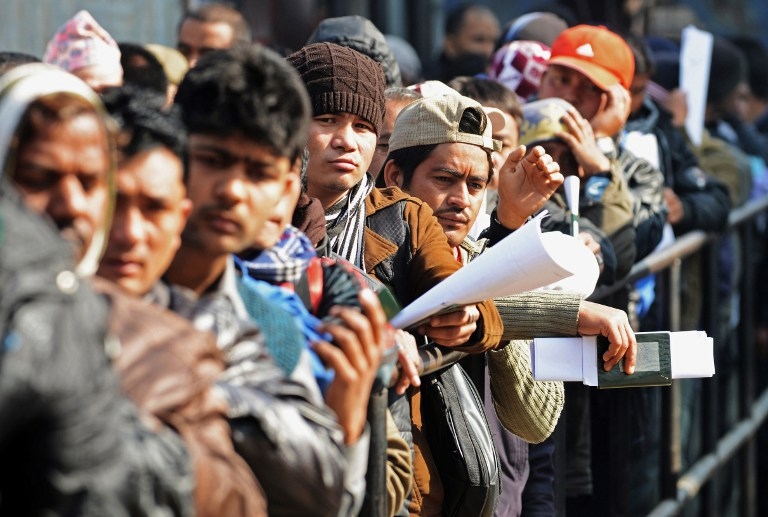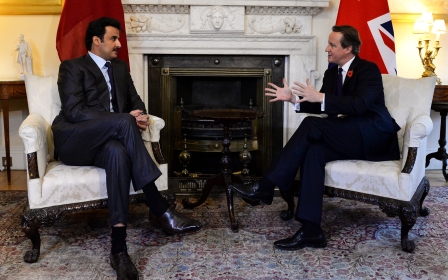‘World Cup slavery’ still rampant in Qatar

Six months after Qatar said it would implement reforms to end the widespread abuse of migrant workers’ rights, Amnesty International said its progress has so far been “woefully inadequate,” and warned that time is running out to tackle exploitation ahead of the 2022 World Cup.
Last year Qatar appointed DLA Piper, a leading international law firm, to examine claims of rampant migrant workers abuses in its construction sector.
In May, Qatar promised to scrap key elements of its controversial labour laws, including the country’s “kafala” sponsorship system, which tethers workers to a single employer.
But in a new report Amnesty said progress to end exploitation had been minimal.
“Qatar has little time left to ensure that the tournament is not built on the back of labour exploitation and forced labour,” said Amnesty researcher James Lynch.
A key failure in the reforms, Lynch said, is Qatar's refusal to ban the use of exit-permits, which give employers control over migrant workers’ movements and can lead to exploited workers being trapped and unable to leave the country.
Last summer, Nepalese workers died at a rate of almost one a day in Qatar, many of them young men who had sudden heart attacks, according to an investigation by the British newspaper The Guardian.
The investigation found evidence to suggest that thousands of Nepalese, who make up the single largest group of labourers in Qatar, face exploitation and abuses that amount to modern-day slavery, as defined by the International Labour Organisation.
Amnesty’s last report found workers from some of the world’s poorest countries were forced to work up to 14 hours a day, for months at a time without pay, in temperatures of up to 113F (45C), and without adequate access to water, safety equipment or medical care.
Many workers’ living conditions were found to be “squalid,” with some sleeping up to 15 to a room in labour camps lacking electricity, running water or air conditioning, and with sewage leaking from the streets.
Qatari officials have made multiple promises of reform, and of tough measures against employers who break Qatari law and exploit workers.
In September 2014 the Emir said in an interview on CNN that he was “personally hurt about the situation” faced by labourers in Qatar.
State-sponsored slavery
After winning the bid to host the 2022 World Cup, Qatar, one of the richest countries in the world per capita, announced it would spend an estimated US$100bn on infrastructure, including a new airport, roads, hotels and stadiums.
Arguments have raged over the risk footballers will face playing in Qatar’s extreme heat, but less attention has been paid to migrant workers, especially those from Nepal who, according to human rights groups, are dying on the job in record numbers.
Last week it was reported that thousands of migrant labourers from North Korea are toiling for years on construction sites in Qatar for virtually no pay – including on the vast construction zone US$45bn (£28bn) Lusail City where the 2022 World Cup final will be held – in what may amount to “state-sponsored slavery”.
Labourers work in the expectation they will collect their earnings when they return to North Korea, but, according to testimonies from workers and defectors, receive as little as 10 per cent of their salaries when they go home, and some may receive nothing.
Qatar, after coming under increased international scrutiny and allegations that it was slow to clamp down on individuals funding radical Islamist groups, like the Islamic State (IS) group, has invested millions of dollars in maintaining its image, recently hiring British PR firm Portland Communications to help manage its brand.
A failure to clean up its act with regard to migrant workers, analysts say, risks further tarnishing Qatar’s reputation.
“It’s a country that is very concerned about its image. The reason you bid for the World Cup is to put yourself on the map. But if steps aren’t taken urgently, its legacy will not be positive, it will be a legacy of abuse of one of the most vulnerable groups in society,” said Nicholas McGeehan, the Bahrain, Qatar, and United Arab Emirates researcher at Human Rights Watch.
“There are people who understand the damage and the risk to the country’s reputation, others think you can get away with things if you spin them correctly, but it’s difficult to spin slavery, which is the category of the types of abuses we’re seeing. The labour system facilitates serious abuses like forced labour trafficking and slavery.”
Stay informed with MEE's newsletters
Sign up to get the latest alerts, insights and analysis, starting with Turkey Unpacked
Middle East Eye delivers independent and unrivalled coverage and analysis of the Middle East, North Africa and beyond. To learn more about republishing this content and the associated fees, please fill out this form. More about MEE can be found here.




